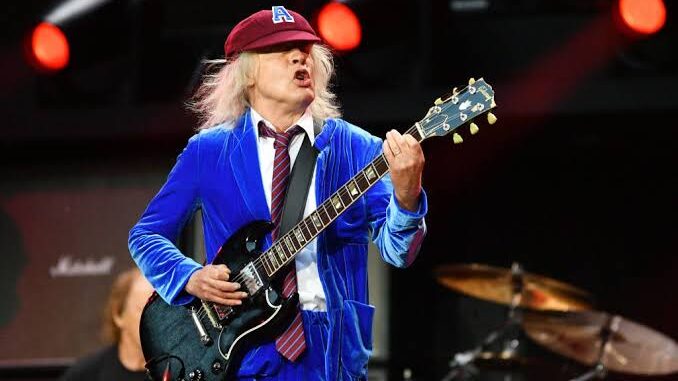
AC/DC, Wembley review: Angus Young is the most preposterous rock showman ever
There were plenty of thrilling moments, but this band is creaking at the joints
And so, for one last time with everything turned up to 11.
AC/DC’s ability to forge their hard-rock voyage through any and all circumstances knows no limits. In the last 50 years they have faced deaths, legal troubles, line-up changes, commercial dips, the passage of time, and the message is always the same: let there be rock.
“Let’s pick up where we left off and play some rock’n’roll,” ever amiable frontman Brian Johnson said after opener “If You Want Blood (You’ve Got It)”, as if any other outcome were possible. It felt like a nod, also, to the fact that he was replaced by Axl Rose midway through the band’s last tour in 2016 due to hearing loss, which surgery has repaired.

Knowing exactly what to expect from AC/DC is key to their appeal: much like Jeremy Corbyn’s political views, this sound – huge riffs, wild guitar solos – was set in stone in 1973. Like most mega rock acts of their vintage, they are as much brand as band, with everyone at Wembley kitted out in AC/DC T-shirts, crop-tops, caps and devil horns that light up (yours for £20 a pop). And so too their show was reliably hardwired and professional.
Minus the theatrics of yore – save for some actual fire for a raucous “Highway to Hell” and, an old trick, a huge church bell that lowered before a cacophonous “Hells Bells” – all eyes were on the stage, particularly on guitarist Angus Young. He remains as Angus-like as ever: slower at 69 with long, thinning grey hair, he nonetheless is still wearing a school uniform and cap, still duck-walking around the stage, still mouthing every note to every solo, still the most preposterous showman hard rock ever produced.
Backed by nephew Stephen, on guitar, Matt Laug on drums (Phil Rudd remains absent after troubles with the law) and Chris Chaney replacing recently retired Cliff Williams on bass, Young roamed free, while sidekick Johnson, in all black and his trademark flat cap, smiled and chuckled his way through like a man at a craft ale festival. Ever self-aware, he both played up to and simultaneously undercut the more dubious, of-its-time lyrical content, such as that about the larger woman in “Whole Lotta Rosie” – a sexual conquest of original singer Bon Scott who died in 1980. It is perhaps the model AC/DC song, with its riff that doesn’t know when to give up.

And boy, was it loud. Ear-splittingly, tinnitus-inducingly loud. Too loud, in fact: for all of its muscle, the sound was often muddy and boomy in Wembley’s vast acoustics. Young’s riffs survived – and they were recognisably exhilarating, some of the best in the rock cannon – but tracks like “Shot in the Dark”, from last album, 2020’s Power Up, were sludgy and undefined. At times Johnson’s voice – an instrument that is sadly on the wane as time catches up with him at 76 – was so low in the mix as to be inaudible. There was the inescapable sense that everything was just a bit of more of a struggle than it used to be, the creaks in the joints harder to overcome.
Yet the goodwill remained, and there were plenty of thrilling moments: “Thunderstruck” was electric; “Riff Raff” was blockbuster blues rock; the power chords of “Back in Black” remain a jolt of excitement like no other. Not everything survived the swamp of noise so well.
For the closing, incessant “Let There Be Rock”, Young’s extended solo, a brilliant yet ostentatious virtuoso display of 15 minutes, kept going long after you thought it must have finished; much like AC/DC themselves. For how much longer remains to be seen, but if this was the last time, it was a powerful way to go out.

Leave a Reply